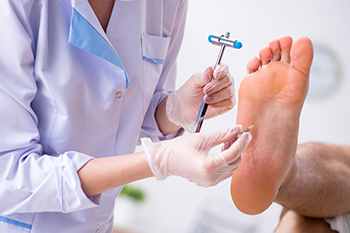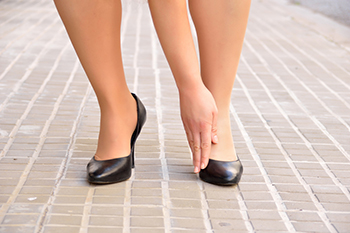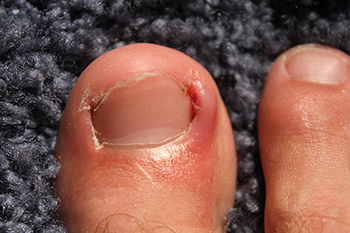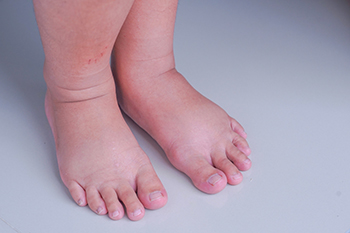Connect With Us
Blog
Items filtered by date: September 2023
How to Become a Podiatrist

Podiatrists, also known as Doctors of Podiatric Medicine, or DPM, are foot specialists who diagnose and treat issues related to the feet, ankles, and lower leg. Becoming a podiatrist involves rigorous training, which includes four years of education at a podiatric medical school. Aspiring podiatrists then gain practical experience through a three-year residency in hospitals and clinics. They also must pass exams to receive certification from the American Board of Podiatric Medicine. Some podiatrists choose to specialize further by pursuing fellowship training to become specialists in their field. Podiatric surgeons, a subset of podiatrists, are required to earn certification from the American Board of Foot and Ankle Surgery, which enables them to perform foot surgeries. To practice legally, podiatrists must obtain and renew state licenses and stay updated with annual seminars to maintain their expertise. To find out more about joining this medical field, it is suggested that you consult a podiatrist.
If you are dealing with pain in your feet and ankles, you may want to seek help from a podiatrist. Feel free to contact Wendy L. Grossman, DPM from New Jersey. Our doctor can provide the care you need to keep you pain-free and on your feet.
What Is a Podiatrist?
A podiatrist is a doctor of podiatric medicine who diagnoses and treats conditions of the foot, ankle, and related structures of the leg. Your podiatrist may specialize in a certain field such as sports medicine, wound care, pediatrics, and diabetic care. Podiatrists have the ability to become board certified through training, clinical experience, and then taking an exam.
What Do Podiatrists Do?
On a daily basis, a podiatrist may perform the following activities:
- Diagnose foot ailments such as ulcers, tumors, fractures, etc.
- Use innovative methods to treat conditions
- Use corrective orthotics, casts, and strappings to correct deformities
- Correct walking patterns and balance
- Provide individual consultations to patients
It is very important that you take care of your feet. It’s easy to take having healthy feet for granted, however foot problems tend to be among the most common health conditions. Podiatrists can help diagnose and treat a variety of feet related conditions, so it is crucial that you visit one if you need assistance.
If you have any questions please feel free to contact our office located in Bloomfield, NJ . We offer the newest diagnostic and treatment technologies for all your foot and ankle needs.
See Your Foot Specialist Regularly If You Work On Your Feet
Best Heel Heights for the Feet

When it comes to high heels, opinions vary widely. Some find them elegant and empowering, while others associate them with discomfort. If you belong to the latter group, it might be because you have not discovered the right heel height for your feet. Comfort varies from person to person, depending on foot shape, shoe type, and experience with heels. The average heel height is around 3 inches, falling into the mid-height range. Low heels are 1 to 2 inches, while high heels are 3 to 4 inches. Finding your ideal heel height may require some experimentation. It's a good idea to prioritize foot health and alternate between heels and flats. To measure heel height, place the shoe on a flat surface and measure from the bottom of the heel to where it connects to the shoe. If you would like to wear heels, it is suggested that you make an appointment with a podiatrist to get advice on wearing this type of shoe for your particular feet and prioritizing style and comfort.
High heels have a history of causing foot and ankle problems. If you have any concerns about your feet or ankles, contact Wendy L. Grossman, DPM from New Jersey. Our doctor can provide the care you need to keep you pain-free and on your feet.
Effects of High Heels on the Feet
High heels are popular shoes among women because of their many styles and societal appeal. Despite this, high heels can still cause many health problems if worn too frequently.
Which Parts of My Body Will Be Affected by High Heels?
- Ankle Joints
- Achilles Tendon – May shorten and stiffen with prolonged wear
- Balls of the Feet
- Knees – Heels cause the knees to bend constantly, creating stress on them
- Back – They decrease the spine’s ability to absorb shock, which may lead to back pain. The vertebrae of the lower back may compress.
What Kinds of Foot Problems Can Develop from Wearing High Heels?
- Corns
- Calluses
- Hammertoe
- Bunions
- Morton’s Neuroma
- Plantar Fasciitis
How Can I Still Wear High Heels and Maintain Foot Health?
If you want to wear high heeled shoes, make sure that you are not wearing them every day, as this will help prevent long term physical problems. Try wearing thicker heels as opposed to stilettos to distribute weight more evenly across the feet. Always make sure you are wearing the proper shoes for the right occasion, such as sneakers for exercising. If you walk to work, try carrying your heels with you and changing into them once you arrive at work. Adding inserts to your heels can help cushion your feet and absorb shock. Full foot inserts or metatarsal pads are available.
If you have any questions please feel free to contact our office located in Bloomfield, NJ . We offer the newest diagnostic and treatment technologies for all your foot and ankle needs.
Understanding the Causes of Ingrown Toenails

Ingrown toenails are painful foot problems, and can disrupt your daily life, leading to discomfort. Understanding the causes behind them is crucial for prevention and effective management. A common culprit is improper toenail trimming. Cutting nails too short or rounding the edges can encourage them to grow into the skin. Tight-fitting shoes or socks can also compress the toenails, increasing the likelihood of inward growth. Trauma, such as stubbing your toe, also can distort the nail's growth pattern. Additionally, inherited factors and genetics can predispose some individuals to ingrown toenails. Infections and fungal conditions can further exacerbate the problem. It is essential to maintain proper nail care, wear well-fitting footwear, and address any foot issues promptly to reduce the risk of ingrown toenails and enjoy pain-free feet. If you have developed an ingrown toenail, it is suggested that you are under the care of a podiatrist who can provide you with relief and treatment options.
Ingrown toenails may initially present themselves as a minor discomfort, but they may progress into an infection in the skin without proper treatment. For more information about ingrown toenails, contact Wendy L. Grossman, DPM of New Jersey. Our doctor can provide the care you need to keep you pain-free and on your feet.
Ingrown Toenails
Ingrown toenails are caused when the corner or side of a toenail grows into the soft flesh surrounding it. They often result in redness, swelling, pain, and in some cases, infection. This condition typically affects the big toe and may recur if it is not treated properly.
Causes
- Improper toenail trimming
- Genetics
- Improper shoe fitting
- Injury from pedicures or nail picking
- Abnormal gait
- Poor hygiene
You are more likely to develop an ingrown toenail if you are obese, have diabetes, arthritis, or have any fungal infection in your nails. Additionally, people who have foot or toe deformities are at a higher risk of developing an ingrown toenail.
Symptoms
Some symptoms of ingrown toenails are redness, swelling, and pain. In rare cases, there may be a yellowish drainage coming from the nail.
Treatment
Ignoring an ingrown toenail can have serious complications. Infections of the nail border can progress to a deeper soft-tissue infection, which can then turn into a bone infection. You should always speak with your podiatrist if you suspect you have an ingrown toenail, especially if you have diabetes or poor circulation.
If you have any questions, please feel free to contact our office located in Bloomfield, NJ . We offer the newest diagnostic and treatment technologies for all your foot care needs.
Common Causes of Swollen Feet

Swollen feet, while often benign, can be discomforting and may point to an underlying issue. Various factors can contribute to this condition. Prolonged standing or sitting, especially in one position, can impede proper blood circulation, leading to fluid accumulation and swelling. Wearing inadequate footwear, whether too tight or unsupportive, can restrict blood flow and aggravate the problem. Medical conditions such as hypertension or kidney disease can cause fluid retention in the lower extremities. Pregnancy also plays a role due to increased pressure on blood vessels and hormonal shifts. Injuries like sprains or fractures can trigger inflammation and swelling as part of the body's healing response. Recognizing the cause of swollen feet is important for effective management. Elevating your feet, staying hydrated, and engaging in a consistent exercise routine can be helpful. However, persistent or severe swelling demands medical attention to address the root cause. If you have swollen feet, it is suggested that you are under the care of a podiatrist who can help you to manage this condition.
Swollen feet can be a sign of an underlying condition. If you have any concerns, contact Wendy L. Grossman, DPM of New Jersey. Our doctor can provide the care you need to keep you pain-free and on your feet.
Swollen feet are a common ailment among pregnant women and people who stand or sit for extended periods. Aging may increase the possibility of swollen feet and patients who are obese often notice when their feet are swelling too. There may be medical reasons why swollen feet occur:
- Phlebitis - A condition that causes the veins to become inflamed and can also cause leg pain.
- Liver disease - This may lead to low blood levels of albumin which is a protein. This can cause fluid in the blood to pass into the tissues and several areas of the body can become swollen.
- Heart failure - When the heart doesn’t pump properly the blood that is normally pumped back to the heart can pool in the veins of the legs causing swollen feet.
- Kidney disease - One of the main functions of the kidneys is releasing excess fluid in the body. This type of condition can make it difficult for the kidneys to function properly, and as a result the feet may become swollen.
- Deep-vein thrombosis (DVT)- This is a serious condition where blood clots form in the veins of the legs. They can block the return of blood from the legs to the heart which may cause the feet to swell. It is important to be treated by a podiatrist if this condition is present.
Swollen feet can also be caused by bone and tendon conditions, including fractures, arthritis, and tendinitis. Additionally, there may be skin and toenail conditions and an infection may cause the feet to swell. Patients who take medicine to treat high blood pressure may be prone to getting swollen feet.
Many patients elevate their feet to help relieve the swelling and this is generally a temporary remedy. When a podiatrist is consulted the reason behind the swelling can be uncovered and subsequently treated.
If you have any questions please feel free to contact our office located in Bloomfield, NJ . We offer the newest diagnostic tools and technology to treat your foot and ankle needs.
Blog Archives
- September 2025
- August 2025
- July 2025
- June 2025
- May 2025
- April 2025
- March 2025
- February 2025
- January 2025
- December 2024
- November 2024
- October 2024
- September 2024
- August 2024
- July 2024
- June 2024
- May 2024
- April 2024
- March 2024
- February 2024
- January 2024
- December 2023
- November 2023
- October 2023
- September 2023
- August 2023
- July 2023
- June 2023
- May 2023
- April 2023
- March 2023
- February 2023
- January 2023
- December 2022
- November 2022
- October 2022
- September 2022

